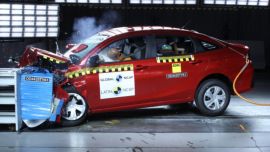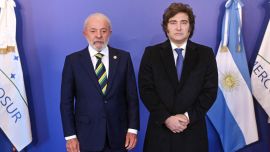Ruling coalition leaders took aim at the opposition on Sunday as they staged an event inaugurating completion of the first leg of the President Néstor Kirchner Gas Pipeline that will revolutionise Argentina’s energy supply.
Government officials turned out in large numbers for the event, held on July 9, Argentina’s Independence Day.
Notably, President Alberto Fernández and Vice-President Cristina Fernández de Kirchner shared a stage for the first time in months, with both showing their support for Unión de la Patria’s leading presidential hopeful, Economy Minister Sergio Massa.
The pipeline, known formally as the Gasoducto Presidente Néstor Kirchner, will allow the transportation of liquefied natural gas (LNG) from the huge Patagonian non-conventional gas and oil deposits of Vaca Muerta to Buenos Aires Province. Its first leg spans 573 kilometres.
Thc system was formally opened at a ceremony at the Saturno gasworks in the town of Salliqueló, 520 kilometres southwest of the capital, assembled to receive shale gas from Tratayén in the heart of the Vaca Muerta deposits in Neuquén Province.
Government officials hailed the completion of the pipeline’s first stage and its impact, which they described as a move towards “energy sovereignty.”
"Faced with what they say is a country of failures and frustrations, today we are showing that we can construct sovereignty," said Massa, a centre-right Peronist who is the main presidential hopeful for the ruling coalition for the October 22 elections.
Construction of the pipeline "cost US$2.5 billion without any external financing. This year we’ll be saving US$2 billion and US$4.2 billion in 2024," pointed out Energy Secretary Flavia Royón on the government’s website.
The second leg of the pipeline, still not tendered, will run 467 kilometres to San Jerónimo in Santa Fe Province.
"When everything is complete, we will be self-sufficient in gas while able to export a considerable volume to Chile, Brazil and Uruguay," added Royón.
The first leg was constructed in only nine months, ahead of schedule, with over 47,700 pipes used.
"We are working on financing the second leg on the basis of a previously agreed credit with the company Power China," said Royón over the weekend.
Improving the balance
Last year’s trade balance for energy was negative to the tune of US$6.633 billion due to diesel and LNG imports.
"Our energy balance will pass from being negative to even-steven and then will start to be positive," according to Royón.
A third of the gas is destined for residential consumption, a further third for industry and the rest for electric power plants, according to the government.
Production of non-conventional gas reached 57.3 billion cubic metres last May, or 10.7 percent up from the same month in 2022, according to government figures, while the production of non-conventional oil rose 26.2 percent in the same period.
The shale gas of Vaca Muerta represents 42 percent of the total produced in Argentina while non-conventional oil reaches 46 percent.
At the time when the YPF oil company was nationalised in 2012, the reserves of crude oil and natural gas had fallen by 67 percent in the last year of the concession to Spain’s Repsol.
The Vaca Muerta deposits, whose potential was confirmed in 2011, contain the world’s second-largest reserves of shale gas and the fourth-largest of non-conventional oil, according to the government on the basis of statistics from the Energy Information Administration (EIA) in the United States.
Macri targeted
With last Sunday’s inauguration doubling up as a campaign rally ahead of the August 13 PASO primaries, government officials were not afraid of attempting to score some political points.
During the inauguration Fernández de Kirchner recognised that the works originated during the 2015-2019 Mauricio Macri Presidency but was highly critical of her Casa Rosada successor.
“During the four years following 2015 there was no forward planning on the project. Do you know how many kilometres of trunk gas pipelines were constructed between 2015 and 2019? All of 53. Do you know how many were constructed between 2003 and 2015? Fully 3,211 kilometres, injecting a daily 26 million cubic metres into the grid,” declared the former president.
The vice-president and Senate chief also had praise for Massa. “This crisis, Sergio, which you now have to tackle, was not provoked by any politician. It was a businessman who brought in the International Monetary Fund (IMF). The then president belonged to a gang of businessmen,” she declared.
Fernández de Kirchner also asserted that while one aim was to "export" gas, the other objective was to guarantee "oil and gas for industry to make it more competitive." Regarding "Argentine homes,” she added that it was sought to keep them supplied “because it is not fair that having the world’s second-largest reserves of non-conventional gas, they want to charge us at international dollar prices."
In his speech, President Fernández highlighted that it was his administration which took the decision to construct the gas pipeline after "the government preceding us tried several times but did not manage it because they could not find the financing, either because the IMF did not let them or because they tried to do it without state funds via a public-private partnership,
“All they invented was a formidable racket whereby the company had a 27-year concession and assured dollar prices. Thank God they did not get away with it,” he declared witheringly.
The one who shan't be named
Macri responded to the criticisms during the inauguration of the Néstor Kirchner gas pipeline, which he refuses to call by its official name.
“The government has announced with great fanfare a gas pipeline which arrives three years late and whose delay has cost Argentina over US$5 billion,” affirmed the ex-president via Twitter.
“In 2019 we left the tender ready and the financing prepared, they only had to go ahead. Instead of that, they made bombastic speeches about sovereignty, self-sufficiency and independence. But the reality is that they again failed with energy, like previous Kirchnerite governments. In 2015 they handed over a brutal energy deficit, which we managed to revert with much effort (on the part of all Argentines), only to lose it again now,” he concluded.
Macri also congratulated the engineers and the construction companies in charge of the 573-kilometre gas pipeline, which he defined as “formidable work,” but he couldn’t pass up the opportunity to expand his criticism.
“Due to the haste and the lack of government foresight it cost US$800 million more than it would have cost in normal conditions. The history of this gas pipeline (excuse me for not calling it by its official name) is another example of the opportunities, the millions and the time which we Argentines have lost due to the Kirchnerite obstinacy to destroy anything done by us.”
– TIMES/AFP/NA


























Comments